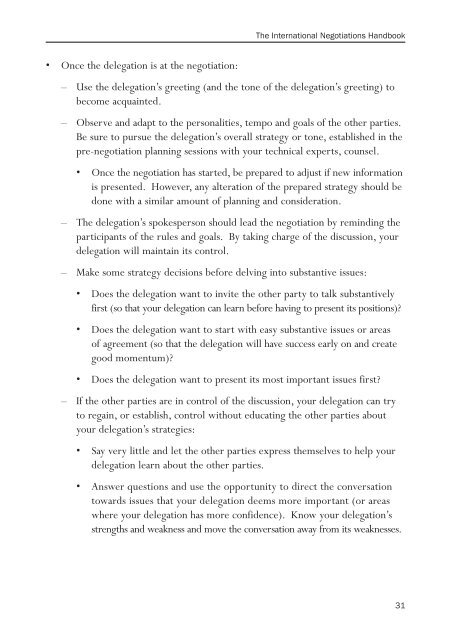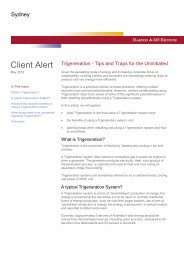The International Negotiations Handbook - Baker & McKenzie
The International Negotiations Handbook - Baker & McKenzie
The International Negotiations Handbook - Baker & McKenzie
Create successful ePaper yourself
Turn your PDF publications into a flip-book with our unique Google optimized e-Paper software.
• Once the delegation is at the negotiation:<br />
<strong>The</strong> <strong>International</strong> <strong>Negotiations</strong> <strong>Handbook</strong><br />
– Use the delegation’s greeting (and the tone of the delegation’s greeting) to<br />
become acquainted.<br />
– Observe and adapt to the personalities, tempo and goals of the other parties.<br />
Be sure to pursue the delegation’s overall strategy or tone, established in the<br />
pre-negotiation planning sessions with your technical experts, counsel.<br />
• Once the negotiation has started, be prepared to adjust if new information<br />
is presented. However, any alteration of the prepared strategy should be<br />
done with a similar amount of planning and consideration.<br />
– <strong>The</strong> delegation’s spokesperson should lead the negotiation by reminding the<br />
participants of the rules and goals. By taking charge of the discussion, your<br />
delegation will maintain its control.<br />
– Make some strategy decisions before delving into substantive issues:<br />
• Does the delegation want to invite the other party to talk substantively<br />
first (so that your delegation can learn before having to present its positions)?<br />
• Does the delegation want to start with easy substantive issues or areas<br />
of agreement (so that the delegation will have success early on and create<br />
good momentum)?<br />
• Does the delegation want to present its most important issues first?<br />
– If the other parties are in control of the discussion, your delegation can try<br />
to regain, or establish, control without educating the other parties about<br />
your delegation’s strategies:<br />
• Say very little and let the other parties express themselves to help your<br />
delegation learn about the other parties.<br />
• Answer questions and use the opportunity to direct the conversation<br />
towards issues that your delegation deems more important (or areas<br />
where your delegation has more confidence). Know your delegation’s<br />
strengths and weakness and move the conversation away from its weaknesses.<br />
31

















